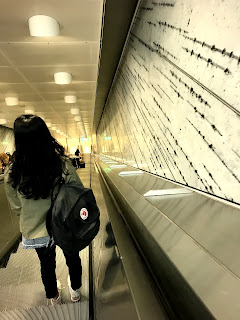If you are new to Sweden and ride public
transport, one thing that will strike you is the fox on every other person’s
back. No, they don’t drape a fox on their back. They carry a Fjallraven Kanken
bag that has the logo of a fox, (it is actually an arctic fox, since that is
what Fjallraven means in Swedish). The bus I ride to work, stops at a school on
its way to the main University. Most people on it carry a backpack and the Kanken
one seems to be the most popular. You see it in different colors and sizes and different
states of fraying. Girls seem to prefer purple, yellow and pink and boys, olive
green and blue. Adults normally carry bigger bags in maroon or black.
The main retailer for the bag is a store
called Nature Companiet. As the name suggests, it is a store that sells
everything for the outdoors, like REI or Patagonia. One wall is draped with Kanken
bags in different colors. It also sells bags that are most stylish than Kanken,
and has an entire selection of outdoor wear. As I started moving around more, I
found it being carried by people on trains, on flights and also riding bikes
with the bag on their backs.
Kanken bags are simply designed and made
using sturdy recycled plastic. They are meant to ease the burden on the back of
Swedish school children. The have a large main container, an outside zipped pocket
and a pocket to hold a water bottle. The laptop version comes with a removable pad. You can carry it on your back using the
simple straps or hold it, using the two small handles.
I knew about Kanken bags before I moved to
Sweden, I read about them in the Financial Times in 2015 and had planned to buy
one for A when she went to college. A year later, she wanted a new backpack
for college and we decided to buy this one. At 110 dollars a piece, it was four
times more expensive than any of her earlier backpacks. The first trip the bag
took was to Istanbul. Istanbul is almost Europe and we found most teenagers
with a Kanken bag. When we left A at Austin, I noticed a wall filled with
Kanken bags in the local Urban Outfitters, and that too in the Longhorn burnt
orange! It wasn’t so exclusive after all! When A got home after freshman year,
her black Kanken was grey. A quick wash in the washer restored it to its
original black.
I have been seeking opinions on various
things Swedish from the locals, the long winter, the amazing range of bakeries
and cafes, the fantastic public transport and of course Kanken bags. My friend,
Annica tells me that their popularity is cyclical and the reason I think they
are ubiquitous is because they are enjoying a revival, given their environmentally friendly credentials. Another colleague in his 50s shuddered at the thought of
carrying one of them as a child. Those days the only color they came in was
olive green. A younger colleague in his 30s told me that his young daughter had
been gifted one by his cool older niece. However, when he was a kid, they only
family that used the bags were the crazy ornithologist next door, who recycled
everything and ate muesli and spent lot of time in the forest! Maybe more
Swedes are behaving like the ornithologist family these days.
As I head back home, I was thinking of
getting myself something very Swedish. To me, nothing says it better than a
Kanken bag. Yet, another informal survey revealed that the bags last for over
25 years. So, I will wait for another two years for A to transition completely
to her new expensive bankers bag and pass her Kanken to me. I am already
composting and eating muesli, and a fox on my back will complete the nature
loving persona.
Two pictures of A with a fox on her back, going down the long and steep escalator at Helsinki airport.


No comments:
Post a Comment